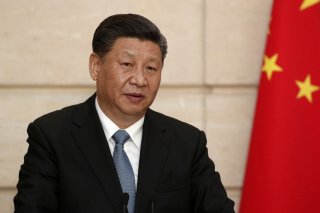Xi Jinping’s Power Grab Is a Gift to the United States
The time for U.S. leadership is now. Thanks to Xi’s overreach, international audiences are more receptive than ever.
Last month, Chinese leader Xi Jinping won a precedent-breaking third term as general secretary of the Chinese Communist Party (CCP) and placed loyalists in every seat of the seven-member Politburo Standing Committee, China’s top ruling body. There is now no meaningful check on Xi’s authority, nor any hope that Beijing might return to more pragmatic economic and foreign policies.
That’s bad news for the people of China. But these developments present opportunities for the United States that, if seized upon, can work to its benefit.
To be sure, Beijing’s reversion toward one-man rule is nothing to celebrate. Nor is the pain Xi’s policies inflict on multinational businesses and the people of China. To make matters worse, it is unlikely that any of the “yes” men who now surround Xi will have the power or inclination to oppose any of his decisions, increasing the risk of serious blunders that could threaten both China’s domestic stability and international peace.
But Xi’s consolidation of power is, in some ways, a gift to the United States. While the CCP seems to view Xi as its best bet for staying in power, the international community has a less rosy view. Xi’s oppressive governance and abrasive foreign policy have alienated many countries, among which are many of China’s most important trading partners. Historically, these nations have been hesitant to pick sides in the U.S.-China rivalry, but over the past five years, Xi’s behavior has pushed them increasingly closer to Washington.
Xi has awakened the international community to Beijing’s true intentions in ways that no American administration ever could. The CCP has always been a revolutionary Marxist party intent on remaking the global order in its image. Even the economic reformer Deng Xiaoping was a hardened revolutionary who adopted some elements of capitalism to create a base of wealth upon which to implement the socialist concept of “common prosperity.” Deng’s order for China to keep a low profile in international affairs sought to put the international community at ease about Beijing’s rise until it became powerful enough to influence the world on its own terms.
For too long, most countries—the United States included—either naively or willfully ignored these facts, preferring to reap the short-term economic benefits of engagement with China to the detriment of their long-term security interests. Even today, many cling to the false narrative that Xi is the source of the world’s problems with China and that, if only he left power, things could revert to the previous status quo.
In reality, Xi did not change the CCP so much as he accelerated changes that were long in the works. Some in China believe he moved prematurely and should have waited for China to develop technological self-reliance and insulate itself against the international backlash that was sure to accompany its greater assertiveness. These voices believe Xi made a mistake. With the right policies and tailored diplomatic outreach, the United States can help ensure they are right.
While most countries are still reluctant to risk attracting Beijing’s ire by placing both feet firmly in the American camp, many are unambiguously edging closer to Washington. In Asia, the rebirth of the Quadrilateral Security Dialogue, or Quad, has seen even proudly non-aligned India increasingly aligning itself with the United States and its Japanese and Australian allies in what is widely seen as a pact to counter Beijing’s influence.
The AUKUS (Australia-UK-U.S.) trilateral security agreement signed in 2021 also reflects a degree of shared anxiety about China. Just a few years ago, British officials openly bragged about being China’s “best partner in the West” and floated the idea of broader UK-China economic engagement following Britain’s exit from the European Union (EU).
While Europe as a whole has been unable to reach a consensus on the nature of China’s threat, private discussions with European diplomats and policy advisors reveal that they are increasingly clear-eyed about the need for like-minded countries to work together. Beijing’s May 2021 decision to sanction EU officials over a dispute involving the genocide of Uyghurs in Xinjiang prompted a major change in the European calculus. Just months earlier, the EU and China had reached an agreement on an investment deal, which would have made it even harder for the United States and Europe to work together against Beijing’s economic coercion. The deal was never ratified.
Meanwhile, in a recent paper, the EU’s foreign policy body acknowledged that China is a “competitor” that promotes “an alternative vision of the world order” and urged the twenty-seven member countries to deal with China as a bloc rather than one-on-one.
Creating consensus among Western and other like-minded countries will not be easy. Germany, for example, continues trying to play both sides. Beijing will be relentless in its use of diplomatic outreach and economic statecraft to prevent and weaken coalitions. It will find the most success with developing countries that benefit from the CCP’s largesse and provide important votes for Beijing at the United Nations.
In striving to form coalitions, the United States must capitalize on the international community’s growing concerns about the direction China is heading under Xi. Of course, the most important imperative is for Washington not to send mixed signals about its own commitment to pushing back against China’s pernicious influence. Washington should recognize that other countries are more susceptible to Chinese economic coercion than the United States and take greater risks when publicly opposing Beijing. Other nations’ willingness to go along will depend in part on their perception of how firmly the United States is standing behind them.
The time for U.S. leadership is now. Thanks to Xi’s overreach, international audiences are more receptive than ever.
Michael Cunningham is a research fellow at The Heritage Foundation’s Asian Studies Center.
Image: Reuters.

